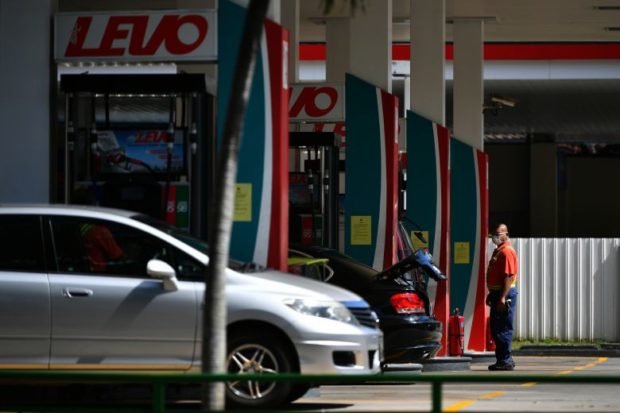Pump prices in Singapore remain unchanged despite plunge in oil prices

A litre of 92-octane and 95-octane petrol is reportedly listed at $2.05 and $2.09 respectively across all brands. The Straits Times/Asia News Network
SINGAPORE — Fuel pump prices in Singapore have not moved since late March, despite crude oil prices falling to below zero on Monday (April 20) before rebounding.
According to Bloomberg, a barrel of West Texas Intermediate (WTI) crude was at a record low of US$1.69 at 9.40pm on Monday, while Brent crude was at US$25.92.
Despite that, pump prices here remained stable.
According to Fuel Kaki, a Consumers Association of Singapore portal that tracks fuel prices, a liter of 92-octane and 95-octane petrol is listed at $2.05 and $2.09 respectively across all brands.
These prices, before discounts, have remained unchanged since March 25, when WTI was around US$20 and Brent around US$26.
Article continues after this advertisementA liter of 98-octane is listed at between $2.43 and $2.69, while diesel is between $1.69 and $1.72.
Article continues after this advertisementMotorists have long complained that pump prices often reflect an increase in oil prices quickly, but are slow to reflect drops.
Mr Jeremy Chua, editor of online motoring magazine Torque, said: “There is no transparency in the pricing of petrol and diesel in Singapore. This is why time and time again, consumers accuse oil companies of collusion and cartel-like behavior.
“Until transparent pricing is mandated, these accusations will continue.”
In a Parliamentary sitting on March 25, Ms Lee Bee Wah from Nee Soon GRC asked if retail prices at petrol pumps reflected the plunge in crude oil rates, which had fallen sharply in earlier months.
She also questioned the time lag in the price decrease being passed on to customers.
Senior Parliamentary Secretary for Trade and Industry and Foreign Affairs Tan Wu Meng said retail petrol prices here had, in fact, fallen with the steep decline in crude oil prices.
He noted that between Jan 2 and March 9, oil prices had plunged from US$66 a barrel to US$34.
Dr Tan said that more than three-quarters of the drop in the price of crude oil was passed on to customers.
“The listed price of octane 95 petrol fell by 20 cents per liter, with a slight lag of six days,” he said. “This represents a pass-through of over three-quarters of the decrease in crude oil price.”
He noted that crude oil has to go through refining and processing before it becomes petrol at the pumps.
“There will also be operating costs, taxes, duties and land costs on the one hand, as well as discounts and rebates on the other hand,” he added.
So, a pass-through rate of about 70 percent is typical, Dr Tan said, citing an in-depth study on retail petrol prices in 2017 by the then Competition Commission of Singapore.
The survey also found that, on average, petrol prices take longer to go up when global crude oil prices increase, compared with the decrease when crude oil prices fall.
The Straits Times has reached out to oil companies for comment.
For more news about the novel coronavirus click here.
What you need to know about Coronavirus.
For more information on COVID-19, call the DOH Hotline: (02) 86517800 local 1149/1150.
The Inquirer Foundation supports our healthcare frontliners and is still accepting cash donations to be deposited at Banco de Oro (BDO) current account #007960018860 or donate through PayMaya using this link.